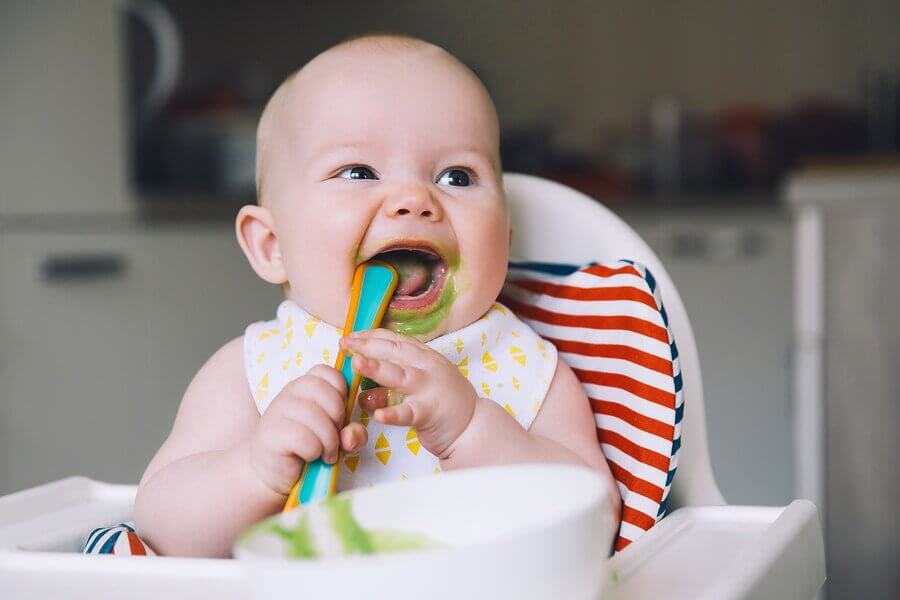How Do I Know if My Baby Is Eating Enough?

When you hold your baby in your arms for the first time, the emotions that rush into you are indescribable. Then, the normal fears about how to provide proper care and prevent illnesses start to worry parents, especially first-timers. In this article, we’ll help you know how to tell if your baby is eating enough.
This is a common concern among parents because it’s important to make sure your baby has good nutrition and develops properly.
Food in the first few months
You should feed your baby by breastfeeding exclusively from the moment he’s born. Many mothers ask themselves how often they should feed their baby. The only answer is whenever your baby demands it.
Since babies’ stomachs are very small and adapt to food intake, they need to eat as often as necessary to keep their bellies full.
At first, you might need to feed your baby every 2 or 3 hours. After the first two months, when he learns to suck and extract breast milk better, he might be able to go 3 or 4 hours between meals.
However, there are situations where parents need to give their baby formula. This could be because the mother isn’t producing enough breast milk, the baby is lactose intolerant, or other reasons beyond the mother’s control.
In these cases, we suggest that you still feed your baby based on what he demands. When your child is hungry, he’ll cry to get attention and food.
However, we don’t recommend forcing him to eat a certain amount of formula. This way, you could actually overfeed him. It could force his small stomach and cause health problems.

Is my baby eating enough?
There are several ways to know if your baby is eating enough, especially in the first few weeks of life. How do I know if my baby is eating enough or if he needs more?
To answer that question, you need to know how much your baby weighs. Normally, at the beginning, babies should gain about 0.2-0.3 pounds per week.
However, if you don’t have a scale to help you know how much your baby weighs, there are other signs that can help you if you aren’t sure that your baby is eating enough. These are:
- Your baby takes breast milk and after 10 minutes, or even before, falls asleep.
- Wets less than 4 diapers a day.
- His skin is still wrinkled after the first week.
- After three weeks, his face hasn’t gotten chunkier and hasn’t become round.
- After making a bottle and falling asleep, he wakes up again asking for food as if he’s still very hungry.
- His skin becomes more yellow, instead of less, in the first week.
Without a doubt, these are sufficient warning signs to take your baby to the pediatrician. Then, he’ll let you know if there’s a problem or if everything is going well.
In this case, it’s important to weigh your baby and compare the results with his previous weight. If there is definitely a problem, you need to look at why your baby isn’t eating enough in order to fix it.
“At first, you might need to feed your baby every 2 or 3 hours. After the first two months, when he learns to suck and extract breast milk better, he might be able to go 3 or 4 hours between meals.”
Is my baby eating too little?
Every child’s body works differently. For some kids, a few servings of food are enough to fill them up. However, other kids might need more.
Therefore, many parents wonder how much their child needs to eat. Phrases like “Is my baby eating enough for his age?” and “How do I know that he ate enough?” are very common.
If everything goes smoothly, babies’ energy needs vary depending on their age and sex. The following guide may be helpful to you:
- 6 months old. Boys should consume between 491 and 799 calories, while girls should consumer between 351 and 819 calories.
- 9 months old. Between 504 and 924 calories are important for boys, while girls need between 459 and 859 calories.
- 12 months old. Boys’ bodies need between 579 and 1159 calories. However, girls need between 505 and 1013 calories.
- 18 months old. Boys need to eat between 804 and 1112 calories. On the other hand, girls need between 808 and 1168 calories.
- 24 months old. For boys, it ranges from 829 to 1301 calories. However, girls need between 761 and 1273 calories.

What do these numbers mean to make sure my baby is eating enough?
If you look closely at the data, the numbers have a minimum amount of calories and end with double. So, if you’re looking at twin sisters that are 24 months old, throughout the day, one could eat 661 calories and the other could eat 1273. Both of them would be in the regular parameters.
We can’t say exactly how much every baby needs to eat since it depends on each baby’s individual body. However, you need to make sure to give the baby the food he asks for.
When babies are well, playful, active and smiling, it shows that they’re healthy. Babies can still be like this even if they eat less than what adults think they need.
Therefore, make sure that your baby is eating enough. Also, ask your pediatrician to make sure that your baby weighs enough and is growing appropriately.
Don’t get carried away by fear. Take the necessary measures on time, and you’ll see your baby grow up happy and healthy without problems.
When you hold your baby in your arms for the first time, the emotions that rush into you are indescribable. Then, the normal fears about how to provide proper care and prevent illnesses start to worry parents, especially first-timers. In this article, we’ll help you know how to tell if your baby is eating enough.
This is a common concern among parents because it’s important to make sure your baby has good nutrition and develops properly.
Food in the first few months
You should feed your baby by breastfeeding exclusively from the moment he’s born. Many mothers ask themselves how often they should feed their baby. The only answer is whenever your baby demands it.
Since babies’ stomachs are very small and adapt to food intake, they need to eat as often as necessary to keep their bellies full.
At first, you might need to feed your baby every 2 or 3 hours. After the first two months, when he learns to suck and extract breast milk better, he might be able to go 3 or 4 hours between meals.
However, there are situations where parents need to give their baby formula. This could be because the mother isn’t producing enough breast milk, the baby is lactose intolerant, or other reasons beyond the mother’s control.
In these cases, we suggest that you still feed your baby based on what he demands. When your child is hungry, he’ll cry to get attention and food.
However, we don’t recommend forcing him to eat a certain amount of formula. This way, you could actually overfeed him. It could force his small stomach and cause health problems.

Is my baby eating enough?
There are several ways to know if your baby is eating enough, especially in the first few weeks of life. How do I know if my baby is eating enough or if he needs more?
To answer that question, you need to know how much your baby weighs. Normally, at the beginning, babies should gain about 0.2-0.3 pounds per week.
However, if you don’t have a scale to help you know how much your baby weighs, there are other signs that can help you if you aren’t sure that your baby is eating enough. These are:
- Your baby takes breast milk and after 10 minutes, or even before, falls asleep.
- Wets less than 4 diapers a day.
- His skin is still wrinkled after the first week.
- After three weeks, his face hasn’t gotten chunkier and hasn’t become round.
- After making a bottle and falling asleep, he wakes up again asking for food as if he’s still very hungry.
- His skin becomes more yellow, instead of less, in the first week.
Without a doubt, these are sufficient warning signs to take your baby to the pediatrician. Then, he’ll let you know if there’s a problem or if everything is going well.
In this case, it’s important to weigh your baby and compare the results with his previous weight. If there is definitely a problem, you need to look at why your baby isn’t eating enough in order to fix it.
“At first, you might need to feed your baby every 2 or 3 hours. After the first two months, when he learns to suck and extract breast milk better, he might be able to go 3 or 4 hours between meals.”
Is my baby eating too little?
Every child’s body works differently. For some kids, a few servings of food are enough to fill them up. However, other kids might need more.
Therefore, many parents wonder how much their child needs to eat. Phrases like “Is my baby eating enough for his age?” and “How do I know that he ate enough?” are very common.
If everything goes smoothly, babies’ energy needs vary depending on their age and sex. The following guide may be helpful to you:
- 6 months old. Boys should consume between 491 and 799 calories, while girls should consumer between 351 and 819 calories.
- 9 months old. Between 504 and 924 calories are important for boys, while girls need between 459 and 859 calories.
- 12 months old. Boys’ bodies need between 579 and 1159 calories. However, girls need between 505 and 1013 calories.
- 18 months old. Boys need to eat between 804 and 1112 calories. On the other hand, girls need between 808 and 1168 calories.
- 24 months old. For boys, it ranges from 829 to 1301 calories. However, girls need between 761 and 1273 calories.

What do these numbers mean to make sure my baby is eating enough?
If you look closely at the data, the numbers have a minimum amount of calories and end with double. So, if you’re looking at twin sisters that are 24 months old, throughout the day, one could eat 661 calories and the other could eat 1273. Both of them would be in the regular parameters.
We can’t say exactly how much every baby needs to eat since it depends on each baby’s individual body. However, you need to make sure to give the baby the food he asks for.
When babies are well, playful, active and smiling, it shows that they’re healthy. Babies can still be like this even if they eat less than what adults think they need.
Therefore, make sure that your baby is eating enough. Also, ask your pediatrician to make sure that your baby weighs enough and is growing appropriately.
Don’t get carried away by fear. Take the necessary measures on time, and you’ll see your baby grow up happy and healthy without problems.
All cited sources were thoroughly reviewed by our team to ensure their quality, reliability, currency, and validity. The bibliography of this article was considered reliable and of academic or scientific accuracy.
- Donovan SM., Comstock SS., Human milk oligosaccharides influence neonatal mucosal and systemic immunity. Ann Nutr Metab, 2016. 69: 42-51.
- Miles EA., Calder PC., Can early omega 3 fatty acid exposure reduce risk of childhool allergic disease? Nutrients, 2017.
- Riley L. K, Ruppert J, et al. Nutrition in toddlers. American Family Physician. Agosto 2018. 98 (4): 227-233.
This text is provided for informational purposes only and does not replace consultation with a professional. If in doubt, consult your specialist.








